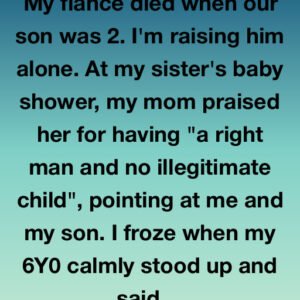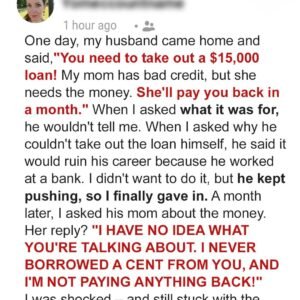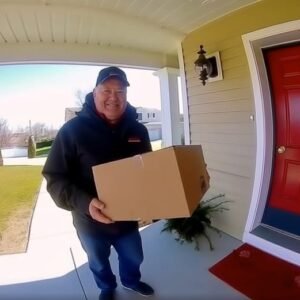You don’t expect to find a miracle wrapped in a cardboard box at 3 A.M. But that’s exactly what happened to me.
I’ve worked the night shift at a gas station for nearly ten years. It’s quiet most nights—just me, the hum of fluorescent lights, and the occasional trucker passing through. It’s a lonely job, but it pays the bills and keeps food on the table for me and my wife, Lena.
Lena and I always dreamed of having kids. We tried for years—doctors, treatments, hope followed by heartbreak. Eventually, they said the word that crushed us both: incompatible. I watched the light fade from her eyes a little more every year. Our home grew quieter. Even her laughter disappeared. I would have done anything to bring it back.
That night, the wind outside was howling. Around 3 A.M., I heard something—a faint, muffled cry coming from the public restroom at the side of the station. At first, I thought I was imagining it. But it came again—a tiny, desperate sound that didn’t belong in a place like this.
I grabbed my flashlight and pushed open the restroom door.
The cry stopped.
Then I saw it—a small cardboard box, sitting beside the trash bin, damp from the leaking pipe above. My heart started hammering. Slowly, I crouched and untied the string holding it shut.
Inside, wrapped in a worn towel, was a newborn baby girl. She was so small, so fragile, her tiny fists clenched, her chest rising and falling in the shallow rhythm of sleep. A note was pinned to her blanket:
Take care of her. I can’t.
For a long moment, I just stared. The air felt heavy, like the world had stopped spinning. Who could abandon a baby here—in a freezing bathroom in the middle of the night?
I knew what I should do. Call the police. Report it. Let the system handle it. That’s the law, and I’ve always followed the rules. But as I reached for my phone, something inside me hesitated.
I imagined the police arriving, taking her to the hospital, then to an orphanage—her tiny life swallowed up by a cold bureaucracy before it even began.
Then I looked down again. She sighed softly in her sleep, a faint sound that cracked something open in me. I couldn’t do it. I couldn’t hand her over and walk away.
I lifted the box carefully and carried her out into the night.
Driving home, I kept glancing at her. She didn’t cry, didn’t move—just breathed, peacefully unaware that her whole life had changed. Mine too.
When I walked into our small apartment, Lena was waiting, half-asleep on the couch. “Evan? Why are you so late?” she asked—and then froze when she saw the box.
“What is that?”
I swallowed hard. “You’re not going to believe this…”
As I told her everything, she stood silent. When I finished, she slowly walked over and looked inside.
“Oh my God,” she whispered, her hand trembling as she touched the baby’s cheek. Then, for the first time in years, I saw something in her eyes again—a flicker of light.
“She’s beautiful,” Lena said softly. “What are we going to do?”
I didn’t have an answer.
But at that moment, I knew one thing for sure: that baby was not spending another night alone.
And that decision—made out of love and madness—was about to put us in the crosshairs of a dangerous man.
The next morning, sunlight poured into our apartment, and for the first time in years, it felt like a home again. Lena was radiant, humming softly as she rocked the baby in her arms. She had already given her a name: Emma.
“She looks like a little angel,” Lena said. “Our little Emma.”
I wanted to tell her we needed to call the police—but I didn’t. I told myself I’d do it later. Maybe after breakfast. Maybe after I saw her smile one more time.
At the gas station that night, I couldn’t concentrate. I kept checking my phone for messages from Lena. Around 10 P.M., a black SUV rolled into the lot. The driver didn’t pump gas—he just parked and came straight toward me.
He was tall, broad-shouldered, with cold, heavy eyes that looked like they’d seen too much violence. He leaned across the counter. “You work nights here, right?”
“Yeah,” I said cautiously.
“I heard you found something last night,” he said. His voice was deep, controlled. “A box. Maybe a baby inside.”
My blood ran cold. I hadn’t told a soul.
“I don’t know what you’re talking about,” I said, trying to sound casual.
He smirked. “You seem like a decent guy. If you hear anything—about the kid, or her mother—you call me.”
He slid a card across the counter. Just a name — Viktor — and a phone number. Then he turned and left, the engine of the SUV roaring into the night.
When I got home, I told Lena everything. The happiness in her eyes vanished, replaced by fear. “He’s looking for her,” she said. “He knows.”
That night, someone knocked on our door. Hard. We froze. When I opened it, no one was there—just a note under a brick.
RETURN HER.
Lena’s hands shook. “He’s coming, Evan.”
I looked at the baby sleeping in her arms. “Then we have to find out who her mother is—and why this man wants her.”
Through a friend on the local police force, I got access to the file. The baby’s blanket had been traced to a nearby store. The purchase was made by a woman named Sophie Novak.
When I finally reached her number, a trembling voice answered. “Who is this?”
“My name is Evan. I think I found your daughter.”
Silence. Then a broken sob. “You have her? She’s alive?”
We met that night in an empty park outside of town. Sophie looked terrified—thin, pale, with bruises that hadn’t fully healed. She told me everything.
Viktor was her ex-boyfriend, a violent man with ties to crime. When she became pregnant, he beat her, demanded she get rid of the baby. She ran, gave birth in secret, and left Emma at the gas station hoping someone kind would find her before Viktor did.
Before we could say another word, headlights cut through the darkness. The black SUV screeched to a stop. Viktor stepped out with another man.
“Well, isn’t this touching,” he sneered. “The little family reunion.”Family games
I turned to Lena. “Go. Take Emma. Get out of here. Now.”
She hesitated, tears streaming. “Evan—”
“Go!” I shouted. She ran for the car.
Viktor lunged, but I blocked his path. He hit hard, years of rage behind every punch. I hit back, every ounce of fear and fury in me exploding. Then I saw the flash of metal in his hand—a knife.
Before he could strike, the night exploded with sirens. Red and blue lights flooded the park. Viktor froze. Then he spat on the ground and ran into the woods.
He was caught two days later. Sophie was placed under protection. Emma was safe.
But Lena and I faced a choice that broke our hearts—we had fallen in love with that little girl, but she wasn’t ours. Sophie wanted to raise her.
We met one last time in a courthouse hallway. Sophie cried as she thanked us. Lena handed Emma to her, whispering, “Be safe, little one.”
Watching them walk away felt like losing a piece of our souls. But as we drove home that night, Lena took my hand. “She taught us something, Evan,” she said softly. “We can still love. We can still be parents.”
The next week, we signed up for adoption. It didn’t erase the pain, but it gave it purpose.
Sometimes, late at night, I think about that moment in the restroom—the faint cry, the box, the note.
Take care of her. I can’t.
I did take care of her. Maybe not forever. But long enough to give her a chance at a life.
And in doing that, she gave us our lives back.



